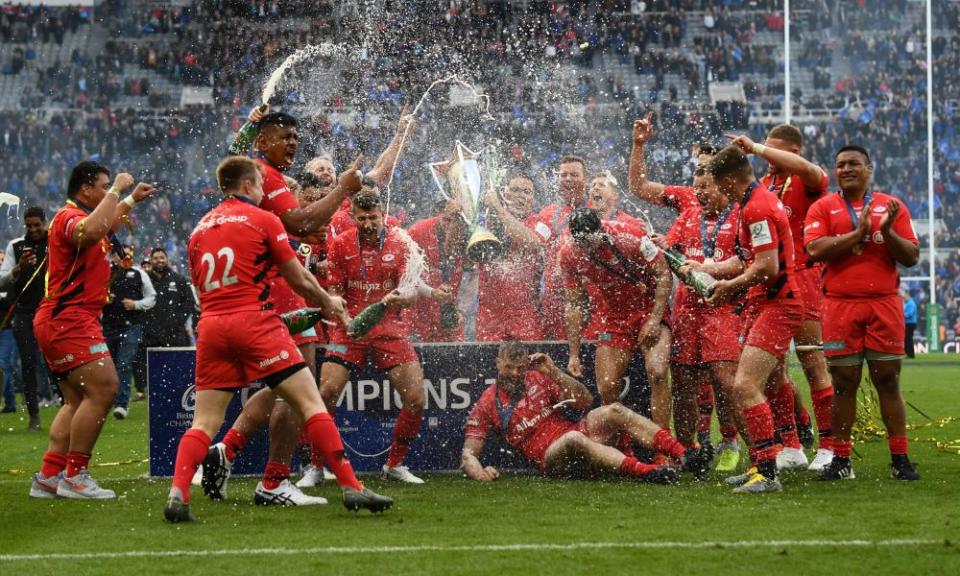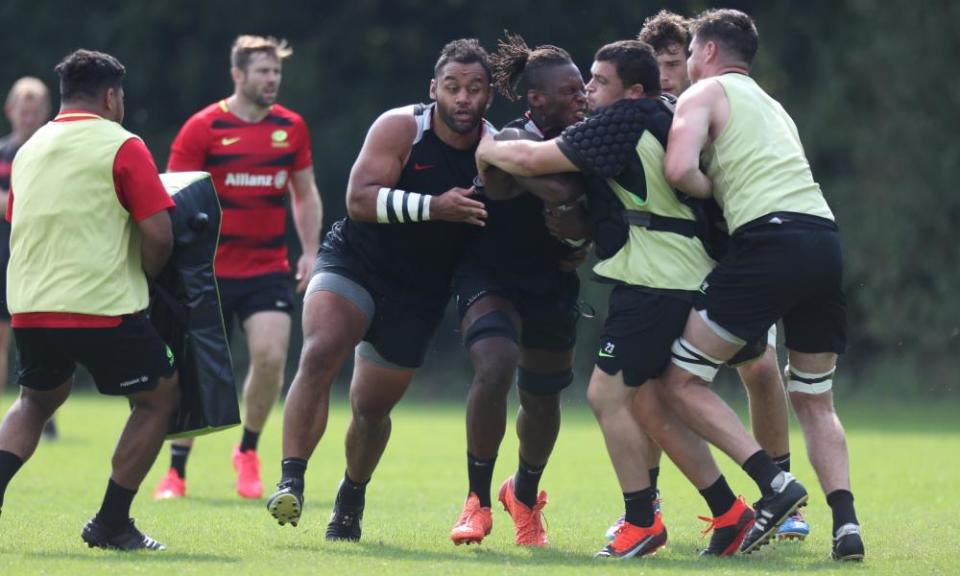End of Saracens era looms as European Champions Cup returns

This is the end
Hold your breath and count to 10
Feel the earth move and then
Hear my heart burst again
Adele – Skyfall
No great sporting dynasty lasts for ever. Personnel changes, hubris, hungrier rivals ... the baton is inevitably handed over at some stage. It could still be that Saracens’ heyday involves one final defiant roar but, whether or not Leinster deliver the last rites in Dublin on Saturday, a defining era in English club rugby is about to conclude.
How people feel about the imposition of the salary cap-related punishment that sentenced Saracens to Championship rugby next season – and accordingly cut out of the European picture for two years – is no longer the primary issue. The stark facts will soon be enough: the continent’s champion team for three of the past four years is about to be wiped from the tournament’s map until the autumn of 2022 at the earliest. Even those who dislike Sarries will find they leave a substantial hole.
Related: Leinster may be favourites but the rest of Europe is out to get them | Robert Kitson
No one is bigger than the game, clearly. But look at the modern history of European club competition and consider, in pure sporting terms, the competitive edge Saracens have supplied. Only Leinster and Toulouse can boast more than their three titles; few teams have exhibited a steelier desire to carry on winning regardless of external distractions. It explains why no one, even now, is entirely writing them off, regardless of their self-inflicted trifecta of diminished status, emotional pain and departed heroes.
Back in the earliest days of the cultural “revolution” at Saracens in 2009, it is a truth universally acknowledged that money was absolutely not their primary motivation. When the head coach, Mark McCall, first met the club’s chief executive, Edward Griffiths, and director of rugby, Brendan Venter, in a cafe on the hill leading up to central St Albans, he was instead told Sarries wanted to strike out in a completely different direction.
People will scoff but to characterise Saracens over the past 12 years as being completely about money is to misunderstand what happened
“We always said it was about the people, not so much about the trophies,” recalls Griffiths, who left the club in 2015 before returning for an ill-fated 26-day stint last winter. “Despite everything that has happened – and without wanting to minimise the mistakes that have been made in recent years – I think the people and the friendships will shine far more brightly than the trophies and the medals they won. There was even an inscription on the trophy cabinet at Allianz Park: the trophies are great but it’s the people who matter.’”
At the time it felt refreshing. Up until 2008 Saracens had paid big wages to a few imported star names but seen little collective return on the field. “It had been a club where it seemed money was the most important thing,” says Griffiths. “People were mostly concerned about how much they would be able to be paid.
“We tried to switch the focus to looking after them better than anyone else, whether that be preparing them for second careers after rugby or looking after their wives and families. I know people will scoff but to characterise Saracens over the past 12 years as being completely about money is to completely misunderstand what happened. The whole point was that it wasn’t about money.”

And whatever outsiders thought about the “wolfpack” defensive mindset – now widely imitated – and their territorial obsession, the strength of the collective was remarkable. Next year will be the 10th anniversary of the first of the club’s five Premiership title successes; Griffiths, though, suspects the reunion will instead be timed to coincide with the squad’s unforgettable “bonding” trip to Miami six weeks earlier.
“There’s a danger when you talk about a club like this that it can come across as some kind of cult. There can be a perception of smugness. But it was never that – it was an attempt to pull together people who were prepared to try unbelievably hard and would be treated unbelievably well. That was the basic idea.”
It is unquestionably the case that those inside the crusaders’ tent will always cherish the friendships they forged, with the less-heralded Justin Melck, Nils Mordt, Petrus du Plessis and Ernst Joubert every bit as fundamental to the project as the marquee
signings. The Saracens academy conveyor belt also continues to deliver consistently, and the on-field memories remain sharp. Who can forget the staggering 46-6 annihilation of Clermont Auvergne in the 2014 European semi-final or the rat-a-tat trophy lifts of 2016 in Lyon, 2017 in Edinburgh and, perhaps most striking of all, last year in Newcastle at Leinster’s expense?
It can be argued their European successes are less tainted by their salary cap rule-bending, given the even greater financial muscle of the big French clubs they eventually overcame. On the other hand, what about the superior seedings and squad depth benefits they enjoyed because of their sustained domestic supremacy? To the minds of their more vehement critics such as Exeter’s Tony Rowe, it is the priceless moments of podium joy unfairly denied to others that rankle most of all.
Griffiths has a slightly different perspective. “The Tony Rowes of this world will say what they want to say and that’s fine. They have their own story at Exeter and they’re perfectly entitled to that. Jealousy may be part of it and no one should overlook the fact mistakes were made as well. But you won’t hear a bad word about Nigel Wray among any of the people involved in the club. Again people outside will say: ‘Of course, that’s because he gave you lots of money.’ But with Nigel it wasn’t about that. People outside the club won’t understand. They’ll only think about money and the issues that have been publicised in recent years. They’ll assume that’s all it was. In fact, that’s the opposite of the truth.”
What is beyond dispute is that Brad Barritt’s battered, bloodied face and Wray’s insistence on standing in the driving rain to watch the eve-of-game captain’s run symbolised a club who made it their business to go above and beyond in all aspects. The pity was that, ultimately, they did not know where to stop, burying all their club’s good works beneath a steaming heap of their own making. Saracens will survive their sky fall – rugby clubs are resilient institutions – but what made them special will be hard to recapture.

 Yahoo Sport
Yahoo Sport 





































